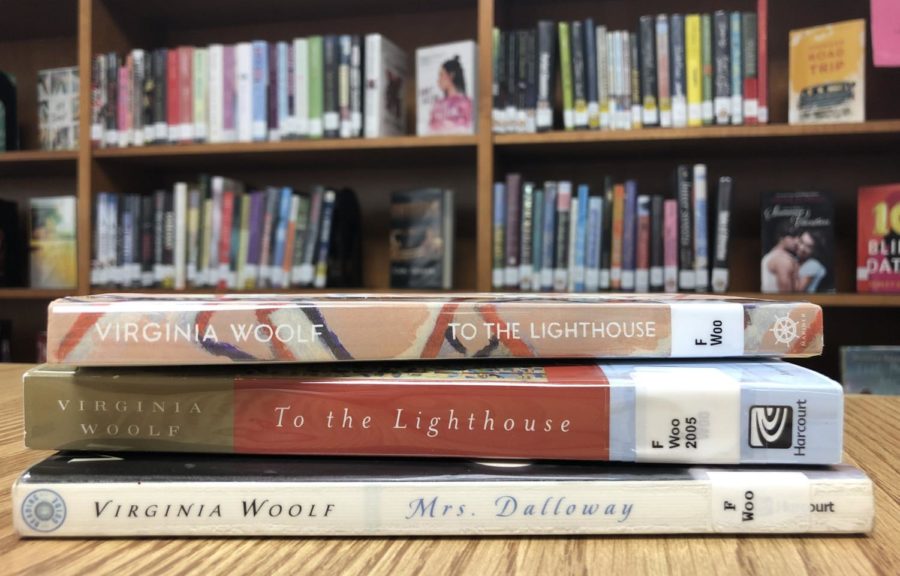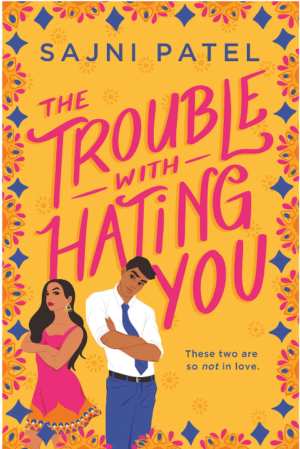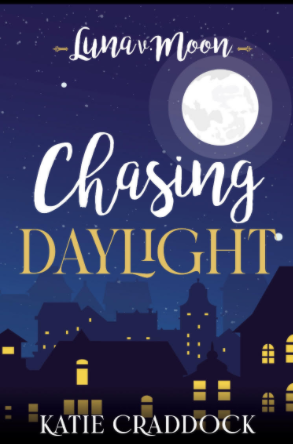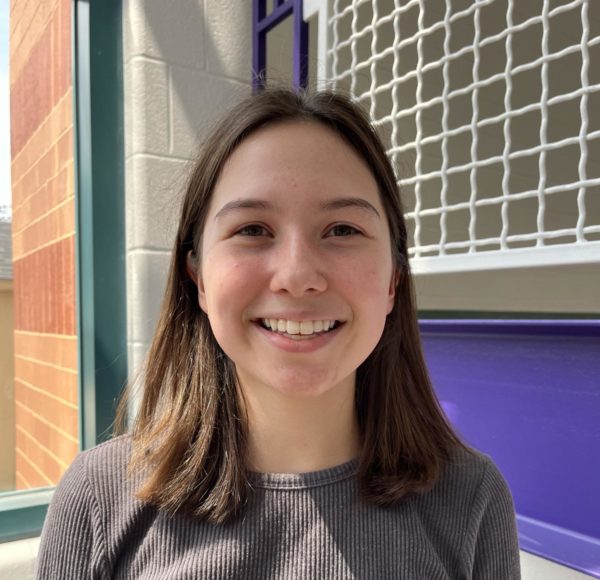The more you read, the more you know: English teachers share favorite books
Students can check out some of Virginia Woolf’s books, as suggested by Guilmartin, in the Chantilly library.
February 18, 2022
Finding that next book to read can be difficult, but English teachers are one source for book recommendations. Not only are teachers exposed to a variety of books that they read and teach in class, but they are avid readers in their free time too. Three English teachers share the books and authors they like to read, as well as the importance of reading.
Lara Shackford, AP Language and English 9 Honors teacher
What are your favorite books and why?
My favorite book is probably the “Elegance of the Hedgehog” by Muriel Barbery. I’ve re-read it multiple different times in my life, and it speaks to me in a different way each time. My other favorite is “Circe” by Madelaine Miller. The world of Greek mythology has become really popular, and it sort of plays on that, but it flushes out a minor female character from “The Odyssey [by Homer]”. It’s nice, as a woman, seeing [the book] build out her character.
Who is your favorite author and why?
Shakespeare. I love Shakespeare. I took every Shakespeare class I could take in college, and I keep taking more. I’d love to teach a Shakespeare elective. [Another] favorite author is Jane Austen. I started reading Austen with my mom when I was young and watched the different adaptations. I didn’t get as much out of reading it in elementary and middle school, but once I got to college, I could really see everything [Austen] was doing.
What is some advice for finding a good book?
I use Goodreads—that’s where I track my books. They have good “if-you-liked-this-you-will-like-this” lists, so if you can remember a book you enjoyed, you can start there to look for similar books.
Why do you think it is important to read?
[Reading] is thinking; it’s getting to know yourself. [Reading] helps you by finding similarities or recognizing contrasts between the [characters’] experiences and your own. It shows you different ways other people see the world, and you can make judgments about that or become aware that there are people who think differently from you. And most importantly, it brings you joy.
Danielle Hicks, English 11 and 11 Honors teacher
What are your favorite books and why?
My favorite, most recent book is “The Water Dancer” [by Ta-Nehisi Coates], [which] my juniors are reading. I love the message at the end, and it was a really enjoyable read for me. My favorite childhood book [was] “A Wind in the Door” by Madeleine L’Engle. I loved science fiction and wonder.
Who’s your favorite author, and why?
I would say Kazuo Ishiguro. I read “Remains of the Day” and I really enjoyed the way it was written. He has [another] book that I read that was more science fiction, and I appreciated how different his books are.
What’s one book that gave you a new perspective?
When I was in college, the first book that I read by a Black author in school was the “Bluest Eye” [by Toni Morrison]. At that point, it hadn’t occurred to me that there was a whole slew of books that were available to me that [I] could dig into and talk about.
What is some advice for finding a good book?
It’s personal to everybody, but what I always ask students when they are out of reading is what kinds of television they like to watch, and [I tell them] to find a book similar to that. The librarians are also great to help find a book. I also often [recommend] John Green, but it really depends on the person.
Why do you think it is important to read?
[Reading] helps you see lives and worlds that aren’t yours. It helps us to be open-minded to other people’s perspectives. Also, it’s nice to have something to relax [with] and to take a break.
Laura Guilmartin, English 9 and 10 Honors teacher
What are your favorite books and why?
I have [a couple of] favorite childhood books because they are comfort books. I always go back to the Harry Potter series because it reminds me of reading them when I was in high school and middle school. I love “Anne of Green Gables” [by Lucy Maud Montgomery too]. I love anything by Jhumpa Lahiri [such as] “Interpreter of Maladies”.
Who’s your favorite author, and why?
I love Jhumpa Lahiri; anything she writes is beautiful and touches on so much of human nature in an interesting way. I also like anything Kazuo Ishiguro writes. He [writes] a lot of dystopian books with science fiction that also do a nice job with sci-fi while touching on human nature. I took a class in college on Virginia Woolf, and ever since, I’ve loved anything [she’s written].
What’s one book that gave you a new perspective?
This has to do with me teaching it over and over, but a lot of Shakespeare plays give me a new perspective on who people are in general. I taught Hamlet for six years, and looking at Hamlet’s perspective on life and living has always made me think every time I have read it. Going back to Virginia Woolf, when I first read her essay “A Room of One’s Own”, that gave me a whole new perspective on feminism that I hadn’t thought [of] before. She made the argument that there could have been a female Shakespeare had women always been given the opportunities.
Why do you think it is important to read?
It makes us better people. It’s always good to open ourselves up to others’ perspectives, and it makes me more empathetic and compassionate. Anytime a book brings me into a culture, it opens up my worldview. I read “The Vanishing Half” [by Brit Bennett] this summer, and a couple [of] years ago, I read “Pachinko” [by Min Jin Lee], and it opened my eyes.





